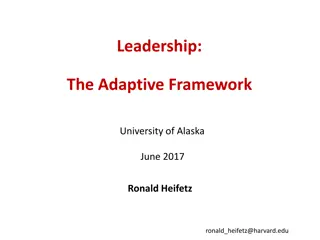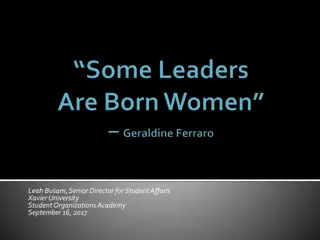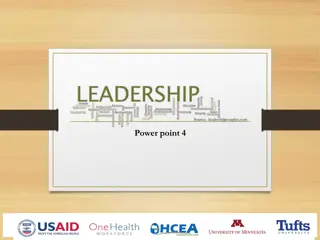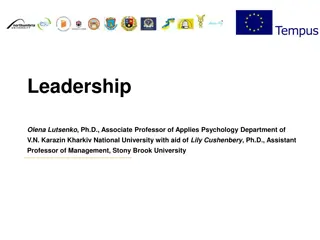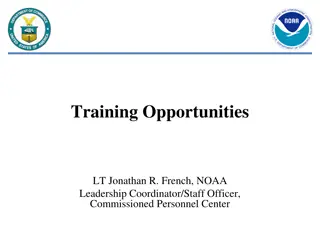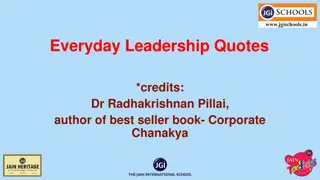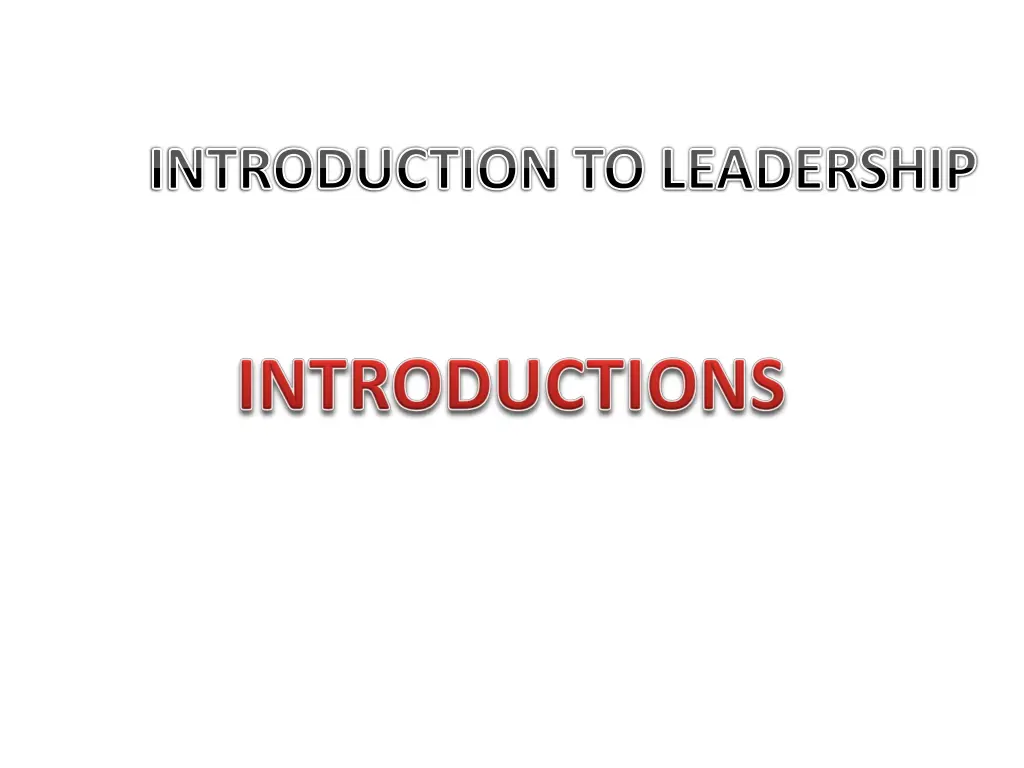
Understanding Leadership in Health Sciences Training
Explore the concept of leadership in the health sciences through definitions, characteristics, and the distinction between leadership and management. Discover the ability to inspire and influence others towards common goals, essential for effective leadership in various settings.
Download Presentation

Please find below an Image/Link to download the presentation.
The content on the website is provided AS IS for your information and personal use only. It may not be sold, licensed, or shared on other websites without obtaining consent from the author. If you encounter any issues during the download, it is possible that the publisher has removed the file from their server.
You are allowed to download the files provided on this website for personal or commercial use, subject to the condition that they are used lawfully. All files are the property of their respective owners.
The content on the website is provided AS IS for your information and personal use only. It may not be sold, licensed, or shared on other websites without obtaining consent from the author.
E N D
Presentation Transcript
CMRT 2018 LEADERSHIP TRAINING: HEALTH SCIENCES 2
DEFINE LEADERSHIP VIDEO CLIPS CMRT 2018 LEADERSHIP TRAINING: HEALTH SCIENCES 3
WHAT IS LEADERSHIP Leadership can be defined as the social process in which one individual influences the behaviour of others to perform certain tasks intended to achieve specified goals. CMRT 2018 LEADERSHIP TRAINING: HEALTH SCIENCES 4
Defining Leadership Leadership is an intangible quality. It cannot be measured in any traditional sense, although we can measure its results to the organisation. Warren Bennis said: To an extent, leadership is like beauty. It is hard to define, but you know it when you see it. 5 CMRT 2018 LEADERSHIP TRAINING: HEALTH SCIENCES
Defining Leadership Leadership is the capability and resolve to rally people to a common purpose. The term can also refer to the character which inspires confidence The leader s role is to inspire others to attain outstanding results. CMRT 2018 LEADERSHIP TRAINING: HEALTH SCIENCES 6
Leadership is a concept of taking charge of a group of people in any setting. In an organisational setting, Leadership is an aspect of Management Management entails Coordinating the activities of groups and Directing group members efforts towards the realization of the organisations goal and objectives. CMRT 2018 LEADERSHIP TRAINING: HEALTH SCIENCES 7
The ability to inspire others The ability to influence others to see things from the same perspective The ability to rally others to a common purpose The ability to instil confidence and trust in others to share in one s vision CMRT 2018 LEADERSHIP TRAINING: HEALTH SCIENCES 8
LEADERSHIP VERSUS MANAGEMENT? CMRT 2018 LEADERSHIP TRAINING: HEALTH SCIENCES 9
LEADER CMRT 2018 LEADERSHIP TRAINING: HEALTH SCIENCES 10
WHO CAN BE A LEADER? DO YOU CONSIDER YOURSELF A LEADER? WHY? HOW CAN YOU BE A LEADER? IN WHAT POSITIONS DO YOU ASSUME LEADERSHIP? LEADERSHIP TEST LET s HEAR WHAT OTHER PEOPLE s VIEWS ARE ON LEADERSHIP VIDEO CMRT 2018 LEADERSHIP TRAINING: HEALTH SCIENCES 11
TEST OF LEADERSHIP Good leadership can be manifested in the quality of the practices of followers. The skilled handling of cases and confidence evident in the followers and their commitment to duty, in the absence of the leader, mark the success and effectiveness of the leader. 12 CMRT 2018 LEADERSHIP TRAINING: HEALTH SCIENCES
Why are the physicians and the whole medical fraternity placed in the leadership mould like business leaders? Why should they not focus on what they were educated and trained to do - practise medicine? To these questions, Dr. John Waldhousen states, in our values and our commitments - as physicians, our primary raison d tre is patient care. The welfare of patients, the education of students and residents, and the growth of research knowledge - these are important commitments underlying our profession. 13 CMRT 2018 LEADERSHIP TRAINING: HEALTH SCIENCES
Dr Waldhousens pronouncements have telling implications on the importance of leadership in the Medical field. 14 CMRT 2018 LEADERSHIP TRAINING: HEALTH SCIENCES
Motivating The team Listening, supporting and giving constructive criticism Coaching and mentoring Managing Diversity Modelling and Sharing the culture Stress LEADERSHIP Management Managing Organisational politics Delegation Initiating and supporting a development culture Effective communication 15 CMRT 2018 LEADERSHIP TRAINING: HEALTH SCIENCES
THE TRUE TEST OF LEADERSSHIP What you leave behind is the true test of leadership. Creating the conditions for the reproduction of the organisation and future effective leaders is the ultimate test of leadership. It is about leaders and managers who can work themselves out of their jobs. It is about the legacy of efficiency, effectiveness and commitment passed on to the team and next generation. Leaders should be aware of their anchor of power! 16 CMRT 2018 LEADERSHIP TRAINING: HEALTH SCIENCES
Sources of power for leaders Firstly, the formal leaders derive their power from their legitimate position within the organisation. French and Raven give 5 main bases of power: Reward Power, Coercive Power, Expert Power, Referent Power, Legitimate/Position Power 17 CMRT 2018 LEADERSHIP TRAINING: HEALTH SCIENCES
Legitimate Power/Position Power Power acquired by virtue of being appointed to a position of authority within the organisational structure. Bestows the power to give instructions, orders and instill discipline and award rewards and punishment for good or bad behaviour respectively. CMRT 2018 LEADERSHIP TRAINING: HEALTH SCIENCES 18
Sources of Power for formal Leaders Legitimacy- this is, behaviour consistent with key organisational values. Values play an important role in organisations. They confer legitimacy and guide the behaviour of the members who adhere to them. Actions that conform to the prevailing value system are deemed credible or legitimate by other members of the organisation. Legitimacy increases acceptance and acceptance is a key to personal influence. CMRT 2018 LEADERSHIP TRAINING: HEALTH SCIENCES 19
. Reward Power Reward power (influencer) is based on one's ability to issue rewards that are valued by the other person Reward power is closely tied to legitimate power. People will comply because they expect positive benefits. The rewards can be in the form of money, promotion, challenging assignment, preferred work shifts and a lot others. Coercive and reward power are opposites. CMRT 2018 LEADERSHIP TRAINING: HEALTH SCIENCES 20
Coercive power French describes coercive power as the power that is based on invoking fear. It is based on the influencer's capability and ability to punish the influencee for failure to meet requirements. It is the negative side of reward power. CMRT 2018 LEADERSHIP TRAINING: HEALTH SCIENCES 21
Expert power Relates to the influence that emanates from possession of expertise , special skills or superior knowledge in a particular field. For example technical knowledge is a great source of expert power. CMRT 2018 LEADERSHIP TRAINING: HEALTH SCIENCES 22
Expert power Managers are believed to possess some degree of expertise by virtue of being elevated to the position they occupy in the organisation (until they prove otherwise) CMRT 2018 LEADERSHIP TRAINING: HEALTH SCIENCES 23
Referent Power Based on admired personal qualities of an individual. The power to draw people to you because of a special desirable trait in you e.g. success in soccer, or singing, charisma, being well spoken, bravery, composure in times of adversity, etc. CMRT 2018 LEADERSHIP TRAINING: HEALTH SCIENCES 24
Referent power cannot be bestowed upon an individual by virtue of their position in the organisation CMRT 2018 LEADERSHIP TRAINING: HEALTH SCIENCES 25
These different sources of power are interrelated and one can operate on more than one at a time, for example, Expert power can also give rise to referent power and information power. Legitimate power will normally go with reward and coercive power and reinforced by referent power, expert power and information power. CMRT 2018 LEADERSHIP TRAINING: HEALTH SCIENCES 26
ADDITIONAL SOURCES Informational power (Greenberg and Baron, 2010) Rational persuasion based on knowledge and ability to be convincing. To rationally pose and explain issues and convince others to buy in 27 CMRT 2018 LEADERSHIP TRAINING: HEALTH SCIENCES
Leaders need to disabuse themselves of the belief that everything of value resides at the top and everyone should aspire to be there. How can leadership add value to those below them and those further down at the bottom rungs of the organisation or section or unit? 28 CMRT 2018 LEADERSHIP TRAINING: HEALTH SCIENCES
29 CMRT 2018 LEADERSHIP TRAINING: HEALTH SCIENCES
Characteristics of a leader Self-awareness Respect and respectful Taking responsibility Constructive rather than critical Persuasive dialogue ideas, changes, patients, fellow workers and leaders 30 CMRT 2018 LEADERSHIP TRAINING: HEALTH SCIENCES
The final test of Leadership is not what the leader accomplishes while in office. It is what happens when they leave the scene. It is the legacy that they leave behind that makes them remembered long after they hand over the reigns of leadership If the enterprise collapses, ------------- (Adapted from James Taylor : Executive Director Community Development Resource Association (CDRA) April 2006) 31 CMRT 2018 LEADERSHIP TRAINING: HEALTH SCIENCES










